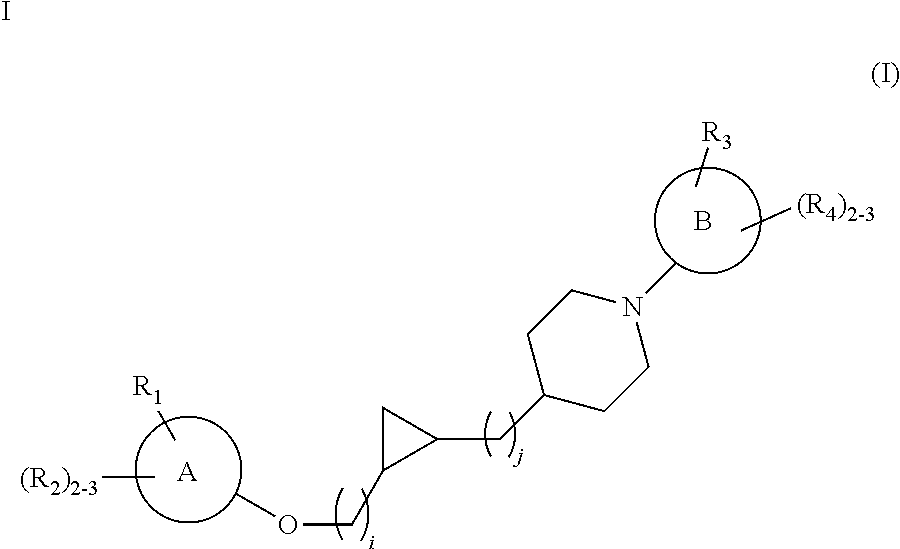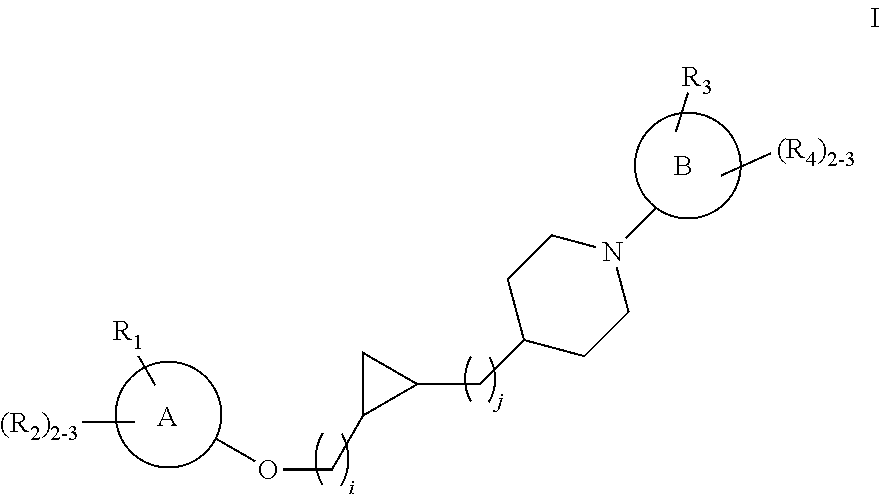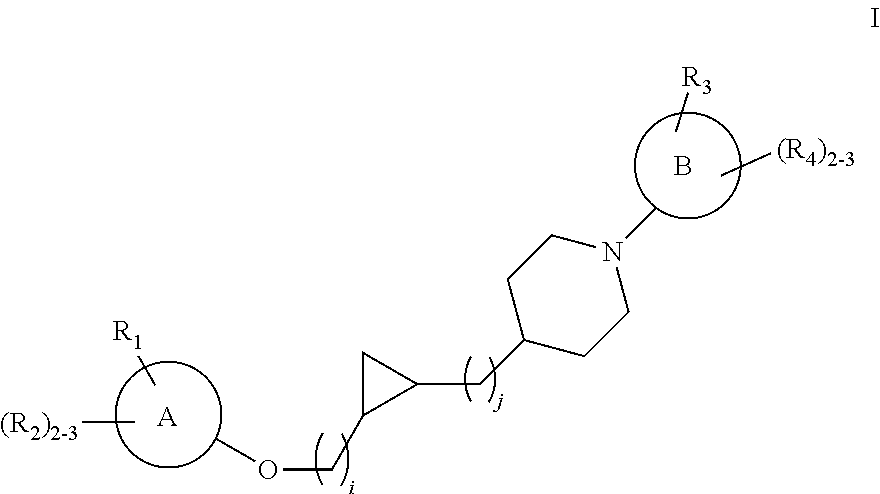Substituted cyclopropyl compounds, compositions containing such compounds and methods of treatment
a technology of substituted cyclopropyl compounds and compounds, applied in the field of agonists of gpr 119, can solve the problems of increased risk of developing conditions, and increased risk of overweigh
- Summary
- Abstract
- Description
- Claims
- Application Information
AI Technical Summary
Problems solved by technology
Method used
Image
Examples
example 1
Preparative Example 1
Preparation of rac cis tert-Butyl 4-[2-(2-hydroxyethyl)cyclopropyl]piperidine-1-carboxylate, i.e. (tert-butyl 4-[(1S,2R)-2-(2-hydroxyethyl)cyclopropyl]piperidine-1-carboxylate and tert-butyl 4-[(1R,2S)-2-(2-hydroxyethyl)cyclopropyl]piperidine-1-carboxylate)
Step 1. Preparation of tert-Butyl 4-[(1Z)-4-(benzyloxy)but-1-en-1-yl]piperidine-1-carboxylate
[0184]
[0185](3-Benzyloxypropyl)triphenylphosphonium bromide (2.88 g, 5.86 mmol) was suspended in 15 mL THF and cooled to 0° C. Sodium bis(trimethylsily)amide (1M in THF, 5.63 mL, 5.63 mmol) was added dropwise. The mixture turned deep orange. tert-Butyl 4-formylpiperidine-1-carboxylate (1 g, 4.69 mmol) in 3 mL THF was added after 5 minutes. Color faded to slight yellow. The reaction was stirred at room temperature for 1.5 hours, before quenching with saturated aqueous ammonium chloride solution. The aqueous layer was extracted twice with ethyl acetate. The organic layers were combined, washed with water and brine, dried...
example 2
Preparative Example 2
Preparation of cis tert-butyl 4-[2-(2-hydroxyethyl)cyclopropyl]piperidine-1-carboxylate
Step 1 Preparation of tert-butyl 4-[(4R)-5-(benzyloxy)-4-hydroxypent-1-yn-1-yl]piperidine-1-carboxylate
[0190]
[0191]Commercially available tert-butyl 4-ethynylpiperidine-1-carboxylate was dissolved in 40 ml of THE and cooled to −78° C. forming a white slurry. Titrated n-BuLi (2.2 Min hexanes, 23.9 ml, 52.6 mmol) was added dropwise with stirring. The clear colorless solution was stirred at −78° C. for 5 minutes. A solution of the R-(+) benzyl glycidyl epoxide (8.63 g, 52.6 mmol) in THF (20 ml) was added dropwise. BF3 etherate (8.43 g, 59.7 mmol) was then added dropwise with a syringe and the solution stirred at −78° C. for 1 hour. Sat'd aq. NH4Cl was added (100 ml), the mixture warmed to RT, diluted with water to dissolve any remaining solids, and extracted with iPrOAc (3×100 ml). The organic fractions were combined, washed with brine, dried over MgSO4, filtered and stripped. Cr...
example 3
Preparative Example 3
Preparation of rac trans tert-butyl 4-[2-(2-hydroxyethyl)cyclopropyl]piperidine-1-carboxylate, i.e. (tert-butyl 4-[(1R,2R)-2-(2-hydroxyethyl)cyclopropyl]piperidine-1-carboxylate and tert-butyl 4-[(1S,2S)-2-(2-hydroxyethyl)cyclopropyl]piperidine-1-carboxylate)
Step 1: tert-Butyl-4-[(1E)-3-methoxy-3-oxoprop-1-en-1-yl]piperidine-1-carboxylate
[0201]
[0202]Lithium chloride (1.013 gram, 1.23 eq.) was suspended in 100 mL HPLC grade acetonitrile. Methyl (diethoxyphosphoryl)acetate (4.33 gram, 1.06 eq.) was added slowly at room temperature, followed by DBU (3.14 gram, 1.06 eq.) and the indicated commercially available aldehyde (4.14 gram, 1 eq.) in acetonitrile (10 mL). The mixture was stirred at room temperature for 3 hours. Excess solvent was removed i. vac. The residue was diluted with water (100 mL) and was extracted with ether (50 mL×3). The combined organic layers were dried over sodium sulfate, filtered, and concentrated to give the crude ester as pale yellow oil, w...
PUM
| Property | Measurement | Unit |
|---|---|---|
| Fraction | aaaaa | aaaaa |
| Volume | aaaaa | aaaaa |
| Electrical resistance | aaaaa | aaaaa |
Abstract
Description
Claims
Application Information
 Login to View More
Login to View More - Generate Ideas
- Intellectual Property
- Life Sciences
- Materials
- Tech Scout
- Unparalleled Data Quality
- Higher Quality Content
- 60% Fewer Hallucinations
Browse by: Latest US Patents, China's latest patents, Technical Efficacy Thesaurus, Application Domain, Technology Topic, Popular Technical Reports.
© 2025 PatSnap. All rights reserved.Legal|Privacy policy|Modern Slavery Act Transparency Statement|Sitemap|About US| Contact US: help@patsnap.com



